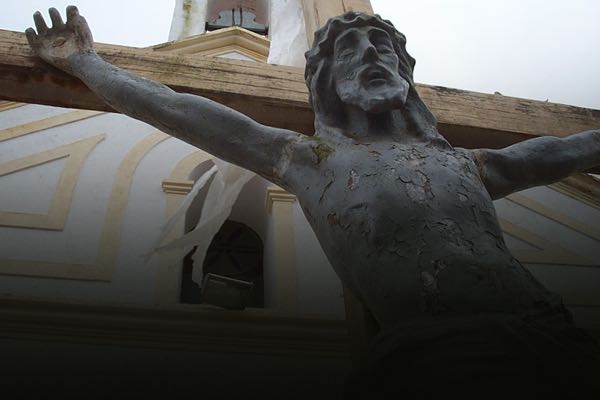 In our Rapid Response series, we tackle common concerns about (and objections to) the Christian worldview by providing short, conversational responses. These posts are designed to model what our answers might look like in a one-on-one setting, while talking to a friend or family member. Imagine if someone said, “I can’t trust what the New Testament says about Jesus: after all, it was written by biased Christians. I can only believe what’s been written by ancient non–Christians, and they don’t say much about Jesus.” How would you answer such an objection? Here is a conversational example of how I recently responded:
In our Rapid Response series, we tackle common concerns about (and objections to) the Christian worldview by providing short, conversational responses. These posts are designed to model what our answers might look like in a one-on-one setting, while talking to a friend or family member. Imagine if someone said, “I can’t trust what the New Testament says about Jesus: after all, it was written by biased Christians. I can only believe what’s been written by ancient non–Christians, and they don’t say much about Jesus.” How would you answer such an objection? Here is a conversational example of how I recently responded:
“When I hear someone demand an ancient non-Christian authority, I immediately recognize the objection for what it is: a complaint about the historical reliability of the Gospels. Some skeptics think you can’t trust the New Testament because it was written by people who were friends of Jesus. They assume those who were close to Jesus would lie about (or exaggerate) the details of his life and ministry. But the Gospel accounts have to be assessed based on their own historical merit, and we have to remember the nature of their authors. Let me give you an example from a case I worked many years ago.
I once investigated a bank robbery in which the robber waited in line prior to committing the crime. As he stood there, he was recognized by the assistant manager (Kathy) who was sitting at a desk. She went to high school with this guy (for the sake of my illustration, let’s call him ‘Mark Hill’). The assistant manager thought, ‘I’ll say hello to him,’ but before she could approach him, he walked up to the teller and began committing the robbery. Mark never even noticed Kathy was in the bank.
Kathy was shocked that Mark was committing a robbery; in high school, she knew him as a smart, kind person. If she had to create a list of all the people she thought would one day commit a bank robbery, Mark would have been on the bottom of her list, if at all. But here he was, committing a robbery, right before her eyes. So here is my question: should I interview Kathy as a witness? Do you think I can trust her?
A skeptic might say, ‘No, you can’t trust Kathy. She’s biased; she thinks Mark Hill is a bank robber. She’s a Mark Hillian. You can’t trust Mark Hillians to tell you the truth about Mark Hill!’ Of course that’s ridiculous. Kathy was convinced that Mark Hill committed a bank robbery not because she was biased against him. She was convinced based on what she saw with her own eyes. She didn’t hold a prior bias based on her friendship, she held a present conviction based on her observations.
Do we really think that someone like Matthew, for example, can’t be trusted simply because he knew Jesus? Matthew wasn’t part of the discipleship of John the Baptist, like many of the other disciples. He wasn’t even a friend of these disciples and he didn’t appear to be seeking the Messiah at all. Instead, Jesus encountered him on the road where Matthew (then called Levi) was collecting taxes. Years later, after watching all that Jesus did and said, Matthew wrote down his observations, not from a position of prior bias, but from a position of present observation. If you can trust Kathy, you can trust Matthew.”
Matthew wrote down his observations, not from a position of prior bias, but from a position of present observation. Click To TweetThis brief answer was modified from my interview with Bobby Conway. To learn more and watch many other short answers to difficult questions, please visit the One-Minute Apologist website.
 For more information about the reliability of the New Testament gospels and the case for Christianity, please read Cold-Case Christianity: A Homicide Detective Investigates the Claims of the Gospels. This book teaches readers ten principles of cold-case investigations and applies these strategies to investigate the claims of the gospel authors. The book is accompanied by an eight-session Cold-Case Christianity DVD Set (and Participant’s Guide) to help individuals or small groups examine the evidence and make the case.
For more information about the reliability of the New Testament gospels and the case for Christianity, please read Cold-Case Christianity: A Homicide Detective Investigates the Claims of the Gospels. This book teaches readers ten principles of cold-case investigations and applies these strategies to investigate the claims of the gospel authors. The book is accompanied by an eight-session Cold-Case Christianity DVD Set (and Participant’s Guide) to help individuals or small groups examine the evidence and make the case.
J. Warner Wallace is a Dateline featured Cold-Case Detective, Senior Fellow at the Colson Center for Christian Worldview, Adj. Professor of Christian Apologetics at Talbot School of Theology, Biola University, author of Cold-Case Christianity, God’s Crime Scene, and Forensic Faith, and creator of the Case Makers Academy for kids.
Subscribe to J. Warner’s Daily Email
Save
Save
Save
J. Warner Wallace is a Dateline featured cold-case homicide detective, popular national speaker and best-selling author. He continues to consult on cold-case investigations while serving as a Senior Fellow at the Colson Center for Christian Worldview. He is also an Adj. Professor of Christian Apologetics at Talbot School of Theology, Biola University, and a faculty member at Summit Ministries. He holds a BA in Design (from CSULB), an MA in Architecture (from UCLA), and an MA in Theological Studies (from Gateway Seminary).


































